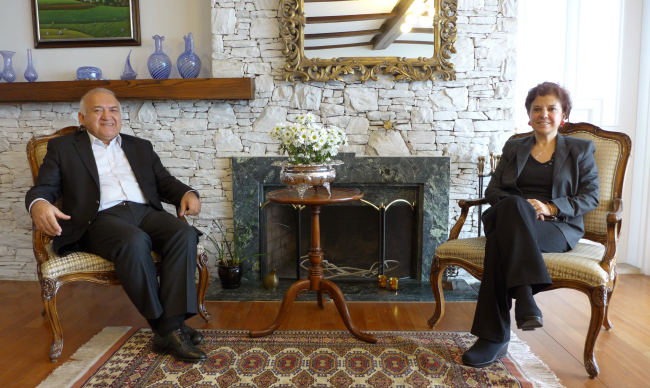Turkey and Korea can cooperate as middle-power nations to bridge the polarized global economy and address increasingly integrated problems facing the international community, Turkey’s foreign deputy undersecretary said during her visit to Korea in late February.
Sherpa Ambassador Ayse Sinirlioglu, who will preside over the 10th annual meeting of G20 heads of government in Turkey’s southeastern city of Antalya from Nov. 15-16, participated in a MIKTA senior officials’ meeting in Seoul.
“Between Turkey and Korea, the sky is the limit,” Sinirlioglu told The Korea Herald at the Turkish Ambassador’s residence in Seoul on Feb. 28. “To strengthen our strategic partnership, the two countries will speak with one voice at MIKTA and G20 as well as the United Nations and World Trade Organization.”
As an informal alliance involving Mexico, Indonesia, Korea, Turkey and Australia, MIKTA was established in September 2013 to boost collaboration on global issues of common interests.
Sherpa Ambassador Ayse Sinirlioglu, who will preside over the 10th annual meeting of G20 heads of government in Turkey’s southeastern city of Antalya from Nov. 15-16, participated in a MIKTA senior officials’ meeting in Seoul.
“Between Turkey and Korea, the sky is the limit,” Sinirlioglu told The Korea Herald at the Turkish Ambassador’s residence in Seoul on Feb. 28. “To strengthen our strategic partnership, the two countries will speak with one voice at MIKTA and G20 as well as the United Nations and World Trade Organization.”
As an informal alliance involving Mexico, Indonesia, Korea, Turkey and Australia, MIKTA was established in September 2013 to boost collaboration on global issues of common interests.

In the first deputy foreign ministerial meeting in Seoul, the five representatives discussed creating a website, establishing activity guidelines, holding business forums and expanding academic exchanges and research.
Korea took the yearlong chairmanship from Mexico last September and will host the next ministerial meeting in May in Seoul.
Sinirlioglu said that through MIKTA’s informal framework, countries can initiate agendas of mutual interests complementary to the G20. “As all MIKTA countries belong to the G20, our memberships reinforce our objectives on multiple levels.”
Representing 90 percent of the world’s economy, 80 percent of trade and 70 percent of population, the G20 has emerged as a premier platform for international economic cooperation, policy coordination and result-oriented action. It takes up a plethora of issues, including sustainable development, food and energy security, climate change, job creation, poverty and corruption reduction.
“This year is pivotal for development cooperation,” Sinirlioglu said. “The Third International Conference on Financing for Development will take place in Addis Ababa, Ethiopia in July, and the United Nations will convene a summit in September to adopt a post-2015 development agenda.”
With the global economy plunging into a post-crisis quagmire of declining growth and uncertainty, the G20’s responsibility as a leading international institution has become more salient than ever, the ambassador said.
At the last G20 conference in Brisbane in November, Turkish Prime Minister Ahmet Davutoglu called for more inclusive governance to give low-income developing countries a stronger voice:
“We want to be the voice of everybody,” he said. “If the G20 agenda is only limited to financial issues, the G20 does not have international legitimacy.”
Turkey has vowed to expand the institution’s mandate beyond economic development to geopolitical issues: the Ebola outbreak in Africa, terrorism in the Middle East and the refugee crisis in Eastern Europe.
“Participating in G20 is a dynamic and evolving process,” Sinirlioglu noted, adding that each presidency ensures the continuity of agenda and aims to reach consensus among member states. Compared to other international organizations, observers say the group’s informal structure enables open dialogue and rapid response to problems.
The ambassador explained the three “I” priorities of inclusiveness, implementation and investment under the Turkish presidency.
“Inclusiveness has both domestic and global dimensions,” said Sinirlioglu. “Domestically, the G20 strives to spread the benefits of growth and prosperity across all segments of society.”
Toward this goal, the organization has set a goal to reduce gender gap in labor participation, youth unemployment and endorse small and medium-sized enterprises. The Turkish government also included inclusive business to the agenda, encouraging businesses to undertake local procurement, employment and other corporate social responsibility initiatives in countries they are investing in.
Internationally, Turkey has prioritized reducing inequalities between nations and making the G20 more relevant to low-income developing countries, Sinirlioglu said.
“Our presidency will play a bridging role between the developed and developing countries with an emerging market point of view,” she emphasized. “We will eradicate poverty and support sustainable development in developing countries.”
For implementation, Turkey has institutionalized greater oversight and discipline by requiring governments to self-monitor their progress and peer-review others.
“Out of the 1,000 policy proposals drawn up from the Australian presidency, we will focus on structural reforms and 5 to 8 of the most impactful policy measures to achieve our goal of boosting global growth by over 2 percent by 2018,” Sinirlioglu pointed out.
The Sherpa Ambassador said that the third pillar of investment is in short supply in both developed and developing countries, particularly in infrastructure. “The OECD estimated that demand for infrastructural investment will amount to $70 trillion by 2030, but this cannot be singlehandedly done by the public sector.”
She added, “It is vital to improve the investment climate and boost private sector’s confidence in these long-term projects.”
Sinirlioglu is the wife of Turkish foreign ministry undersecretary Feridun Sinirlioglu and was appointed as a deputy undersecretary in December. She served as an ambassador to Romania (2008-11) and Spain (2011-14).
By Joel Lee (joel@heraldcorp.com)
-
Articles by Korea Herald








![[KH Explains] No more 'Michael' at Kakao Games](http://res.heraldm.com/phpwas/restmb_idxmake.php?idx=644&simg=/content/image/2024/04/28/20240428050183_0.jpg&u=20240428180321)

![[Weekender] How DDP emerged as an icon of Seoul](http://res.heraldm.com/phpwas/restmb_idxmake.php?idx=644&simg=/content/image/2024/04/25/20240425050915_0.jpg&u=)








![[Herald Interview] Mistakes turn into blessings in street performance, director says](http://res.heraldm.com/phpwas/restmb_idxmake.php?idx=652&simg=/content/image/2024/04/28/20240428050150_0.jpg&u=20240428174656)
